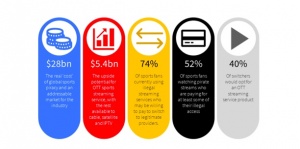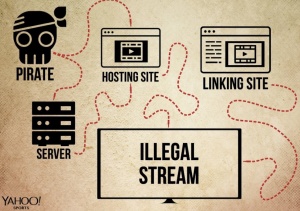Illegal Sports Streams
Contents
Background
As the Internet has contributed many positives to society as we know it, not everything found on the Internet is a good thing. For example, illegal streaming of live sporting events has grown to be an extremely pressing issue that many of the most established sports leagues are trying to combat. With the increase in complexity and capabilities of technology, it has become easier and easier for people to stream pirated versions of different sporting events for free to their viewers. Over time, this has cost billions of dollars in revenue for major sporting organizations because consumers are able to watch their beloved sports teams for free in random corners of the Internet without having to pay a dime. There have been a lot of resources thrown at trying to combat this problem, with very little success. It will be interesting to see how this situation evolves in the future as illegal streaming continues to grow in popularity amongst consumers.
How Popular are Illegal Sports Streams
Since there has been a rapid increase in the technological ease of creating illegal sports streams, there has also been an increase in the percentage of people who take advantage of these streams. A 2020 study conducted by Ampere Analysis found that 51% of all sports fans regularly watch their sports through pirated sources. What is even more concerning for the sports industry is that only 16% of respondents in this survey claimed that they have never watched sports using an illegal service. This study yielded results with high confidence as there was a sample size of over 6,000 sports fans from over ten different countries. [1] This further emphasizes the point that this issue extends far beyond just one country. It has grown into a global nightmare for many of the top sports leagues in the world including the NFL, NBA, and English Premier League.
Why Illegal Streaming is so Difficult to Stop
Major sports leagues and companies such as the NBA and ESPN have been fighting an uphill battle to combat illegal sports streams because there are so many variables in play. First of all there thousands of different websites that you can illegally stream sports from, making it very difficult to shut them all down. And even if you are able to shut one down, viewers can just jump to the next until the original stream is back up and running under a different identity. Another reason these major corporations are facing a difficult challenge is because of the professionalization of the industry in illegal streams. Streamers and pirates have become so technologically advanced and specialized in what they do, making them a difficult opponent for companies to take down. Finally, there are legislative battles that these sports leagues are facing to shut down pirated streams, especially in the United States. In 2012, there was a proposed bull called the Stop Online Piracy Act (SOPA) that would have enacted polices to limit the abilities of illegal streams. There were major concerns about restricting Internet freedom, which ultimately led the bill to fizzle out without any real solutions being created. [2]
The Impact of Illegal Streaming
The exact impact that illegal streaming has on sports is difficult to pinpoint, but it is significant nonetheless. For example, one of the most exciting UFC fights of the year, Tyson Fury vs. Deontay Wilder, had 325 thousand people in The United States pay to watch the fight legally. However, there was an estimated 1.9 million people who used pirated streams in order to watch the fight, causing the UFC millions of dollars, as the fight cost $75 to purchase. [3] Out of all the sports that can be streamed illegally, the UFC is estimated to take the biggest hit because all of their events are pay per view, meaning that customers have to purchase the rights to watch each fight rather than just being able to watch the event on their cable packages.
NBA president Adam Silver has also taken note of the drastic decrease in television revenue even though demand for NBA games has increased. In an interview about the matter he says, “We know from every bit of research we have, from all the social media platforms, there’s more interest in our product than the ratings reflect.” [3] In order to address this problem, it is important to understand the root of the issue. In order to get more people to pay for streaming services legally, you have to understand the customers point of view. They can either stream for free and sacrifice some quality and lag time or pay for a high quality service. Leagues around the world are starting to understand this and identify ways to make legal streaming more readily available and at cheaper costs. They also need to advertise that these legal steams will provide better user experiences, higher quality entertainment, and less complications without annoying advertisements, buffering, and lag time. For example, the National Football League (NFL) has introduced new and free streaming services via Twitter and Twitch in order to increase legal viewership. [4] Although tactics like this have seen some success, there is a lot more work to be done. It will be interesting to see how major sports corporations continue to fight illegal streaming in the immediate and distant future. One thing remains for sure though: illegal streaming does not appear to be going anywhere anytime soon.
References
- ↑ Carp, Sam. “Study: 51% of Sports Fans Watch Pirate Streams despite 89% Owning Subscriptions.” SportsPro, 4 June 2020, www.sportspromedia.com/news/live-sport-piracy-service-pay-tv-ott-platform-subscription-study.
- ↑ “SOPA/PIPA: Internet Blacklist Legislation.” Electronic Frontier Foundation, www.eff.org/issues/coica-internet-censorship-and-copyright-bill.
- ↑ 3.0 3.1 Bushnell, Henry. “Inside the Complex World of Illegal Sports Streaming.” Yahoo!, Yahoo!, 27 Mar. 2019, www.yahoo.com/lifestyle/inside-the-complex-world-of-illegal-sports-streaming-040816430.html.
- ↑ Soper, Taylor. “Twitter Says Live Streaming of NFL Games Went 'Incredibly Well'; No Word on Deal for next Season.” GeekWire, 3 Jan. 2017, www.geekwire.com/2017/twitter-says-live-streaming-nfl-games-went-incredibly-well-no-word-deal-next-season/.

